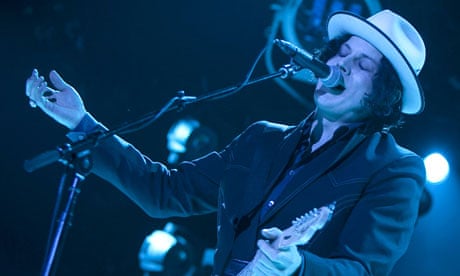If you've attended a Jack White show this year, you might have seen a very modern sign. Jack White does not want you to use social media at his shows. He's unequivocal about this. Signs at the gig tell you that the use of Twitter and Facebook is "strictly prohibited". The sign also urges fans to "please leave your phones in your pockets/purses and enjoy the show live and in person".
In person!? Get with the times, Jack! If you're at a gig and haven't shared a blurry Instagram picture of the lead singer on every social platform available, then that gig might as well not have happened. In the age of Facebook, Instagram and Twitter, there are a multitude of ways to avoid actually watching the band you've paid good money to see and instead show off to your friends who aren't there with you.
White explained his thinking earlier this year: "The gadgetry for the experience of a live show has gotten ridiculous. The worst thing is to watch a young kid watching a show on their camera screen instead of watching it on stage. You just want to take it out of his hand and go, 'come on man, that's not what this is about'."
White has some unlikely allies in his one man war against "gadgetry". Just last week Bruce Dickinson spotted an offender in the crowd and let out the razor-sharp barb of "you're a wanker!" to the fan whose phone had been glued to his hand all the way through three entire songs. The irony that the incident was recorded on a phone can't have been lost on many people.
There is also the story of nerdcore rapper MC Chris who last week threw out fan Mike Taylor after he tweeted his dissatisfaction with the support act. Taylor's tweet was hardly the most damning criticism we've ever heard: "Dear nerd rapper opening for Powerglove/mc chris. You're not good enough to pander to me. Better luck next time." Yet it was deemed harsh enough to elicit this response from the stage: "Security is going to take you the fuck out now! That's what you get for talking shit on Twitter!"
Chris soon issued a tearful video apology on YouTube, and personally tweeted his remorse to Taylor, yet this highlights how performances are increasingly being shaped by immediate (and knee-jerk) fan reactions. After all, it only takes one disgruntled fan to influence the opinions of those who didn't experience the event first-hand. And, if you were busy voicing your opinion mid-show, how could you possibly be enjoying the show in the way it was intended?
Yes, social media is now part of the gig-going experience, and we all like to take vintage-looking pictures of bands and pretend to our friends that we're cooler than we are (or, more importantly, cooler than they are). But why we do we feel the need to prove we were there – especially in a way that means we're therefore less there, because we're not actually watching? Why we do we have to document every experience? What does it actually achieve, other than improving your Klout score?
Our preoccupation with tweeting, posting, texting and filming destroys the intimacy of what the best live performances should be, which is a captivating and all-encompassing experience. And it's not just for the benefit of the artist I'm saying this, but also for the guy (that's me or you) who has arms bouncing off the side of their head during gigs, or can't see because someone has their iPad held up like a scorecard at a beauty pageant.

Comments (…)
Sign in or create your Guardian account to join the discussion